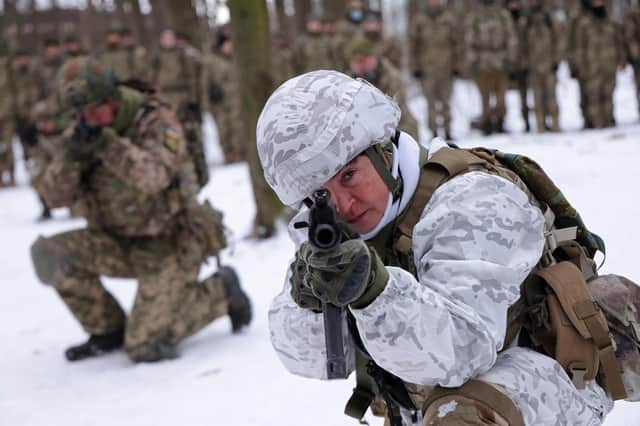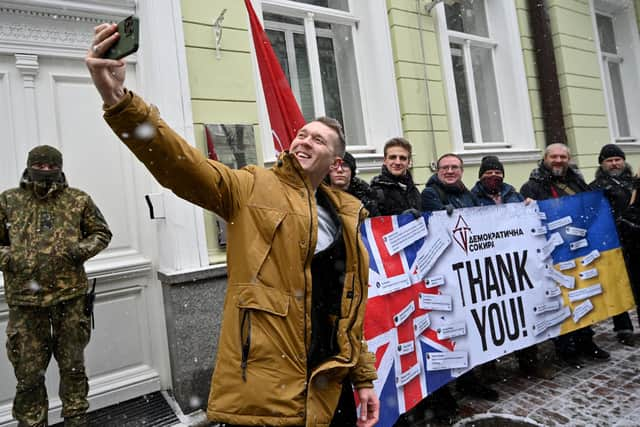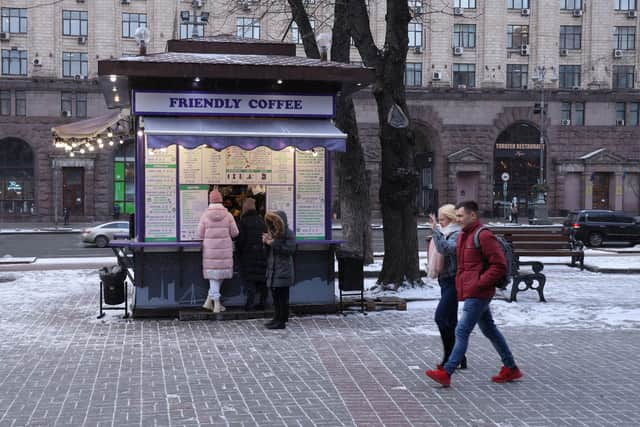As Russian invasion threat looms, Ukraine's people have adopted a survival strategy of 'keep calm and carry on' – Lesia Vasylenko


As everyone is left guessing what Putin will do next, Ukrainians have been flooded by messages of worry and support from all over the world.
A typical reply to a typical message from someone outside Ukraine usually goes along the lines of “we are fine, everything is fine”. In a way, this also reflects the Ukrainian government’s rather cool reaction to foreign intelligence reports outlining the high risk of an imminent attack.
Advertisement
Hide AdAdvertisement
Hide AdSuch calmness puzzles all those outside the country and causes a lot of raised eyebrows in foreign relations.
So why is everyone in Ukraine so relaxed? And are they really?
First thing to understand is that Ukraine has been living in a state of war for seven, going on eight years now. Day in, day out, since 2014, the country has been waking up and going to sleep with messages of war: ceasefire broken, shooting on the border, so many dead, so many wounded and so on.
With war constantly in the background of everyday life, people here have learnt to simply keep calm and carry on.


Over the years, this has become increasingly easy to do. Since Russia’s invasion in 2014, the Ukrainian army has grown stronger and much less reliant on volunteer help.
The theatre of war has been localised in the eastern most parts of the country, 500 miles away from the capital in Kyiv and even further from Lviv, a bustling city in western Ukraine.
And as the number of daily casualties of war dropped significantly compared with 2014-2015, the 14,000 Ukrainian soldiers who died became a very sad number Ukrainians just have to live with.
The longer you live in war, the less emotional you are about things and the more you tend to rationalise the situation around you. Moreover war, and especially war with Russia, is not something anyone can control or predict. When faced with situations beyond personal control, the human brain adopts a whole array of survival tactics, simply not to go mad with panic and anxiety.


Advertisement
Hide AdAdvertisement
Hide AdConcentrating on anything but war is one such tactic. This is why business is going on as usual, even despite a slump in investments. New shops and restaurants are opening and working as normal as possible, given the restrictions brought on by the pandemic. And people are going about their usual routine in the streets in towns and cities across Ukraine.
This war-numbness Ukrainians developed to Russian threats actually proves to be an effective weapon against Putin’s hybrid psychological warfare.
Intuitively every Ukrainian has a deep understanding that all the talk of possible attacks on Kyiv and other hostile declarations from a country with one of the biggest armies in the world is aimed at causing fear, public unrest and destabilisation. Putin is waiting just for that: a paralysed and demoralised Ukraine. And the people here are not about to give into this game.
Instead, Ukrainians are standing stronger than ever, in unity against the aggressor. If Russia attacks, everyone here will be the first to have to deal with it. There’s no doubt about that.
The question remains as to how.
As attack scenarios are infinite, people are left to prepare the best they can. Some are buying weapons, ammunition and enlisting with local territorial defence units. Some are packing emergency suitcases and checking their neighbourhoods for bomb shelters. And some are organising passports and visas and thinking up plans for emergency evacuation.
All this is nothing new. Over the years, these options have been considered and reconsidered by millions of Ukrainian households. Such deliberations make up part of the intricate background of war that has accompanied Ukrainians for almost a decade now.
However, all this detailed planning is no more than a self-calming exercise many Ukrainians engage in to ward off feelings of panic and helplessness. Should the Russian army really hit Ukraine with all its might, it’s hardly likely that any of those plans will be implementable. Missiles, air strikes and closed borders is the more realistic picture.
Such a scenario calls for a full mobilisation of all national resources and declaration of a state of war. It’s up to the national defence and security council and the president to work out the detailed plans in this case.
Advertisement
Hide AdAdvertisement
Hide AdHowever, the government is keeping quiet, as if also choosing to block out thoughts of war. The “come what may” approach is explained by lack of confidence and control over a situation where Ukraine is alone in facing the biggest army in Europe.
Despite the number of weapons and military technology provided, the UK and other Nato members have made it explicit that no military personnel shall be deployed on Ukrainian soil.
Then there is also the issue of a humanitarian disaster. No one is really speaking of mass evacuation plans. Not much is being done about accumulating critical survival supplies. Most bomb shelters in big cities have long become private property, hosting shops, bars, beauty salons and other spaces unfit in the event of missile strikes.
Ukrainians are well aware of this and know that, at the end of the day, it will be everyone for themselves and their country. Comfort is found in reminding each other how even more unprepared the country was in 2014 and how we survived.
Whatever form Russian aggression takes next, it is certain that Ukrainians will carry on standing in defence of their homes, their families, their land and the right of their children to live as a free and independent people.
This is the fuel behind the resilience and calm demeanour of every Ukrainian who answers that all is well in this time of crisis.
Lesia Vasylenko is a Holos MP in Ukraine
A message from the Editor:
Thank you for reading this article. We're more reliant on your support than ever as the shift in consumer habits brought about by coronavirus impacts our advertisers.
If you haven't already, please consider supporting our trusted, fact-checked journalism by taking out a digital subscription.
Comments
Want to join the conversation? Please or to comment on this article.
